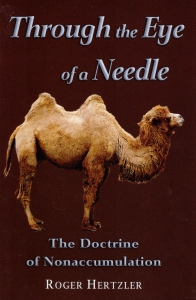« Small Order Fee | Home | A Home for Sarah »
Through the Eye of a Needle
By Mark Roth on November 14, 2007 at 10:35 am

Christian stewardship, as commonly taught today, tells us that part of wise financial management is to deposit money regularly into savings and allow it to accumulate. The doctrine of nonaccumulation, on the other hand, states the Jesus forbids His followers to accumulate wealth on earth and commands them to distribute to others that which they do not currently need.
Which of these teachings is correct
How important is it that we know?
What is really at stake if we answer these questions wrongly?
101 pages. Paperback. Benchmark Press. Roger Hertzler.
Published in 2006.
For more details as well as the option to buy: Through the Eye of a Needle
Topics: New Products | 1 Comment »



January 25th, 2010 at 6:40 pm
Read my full review, along with Hertzlers response at my website http://www.thoughtspercolating.blogspot.com
“A plausible rebuttal”, it “may have some validity” -Hertzler
It is true that we should not seek to be rich or to lay up treasures on earth, this is a simple biblical truth, and thus above argument. It is in the application that the real distortion is presented, and when challenged about his applications, Hertzler reverts to the base scriptures, and then questions the readers’ devotion to the word of God rather than building a true argument. He uses a classical burden of proof fallacy where the straw man opposition arguments must unequivocally disprove “the doctrine of non-accumulation”. The terms “treasure”, “wealth” and “investment” carry very different meanings and are translated from different Greek words. Thus they cannot be used interchangeably at will, as Hertzler does, to suit a particular argument. Hertzler’s implicational arguments, the bulk of his book, do not concur with other biblical principles concerning wealth and man’s responsibility to care for his own household, which is why elaborate discussions regarding God overruling himself, dispensations, and convenient theology become necessary to support his singular and oversimplified message of fiscal abandonment. Nor does the Bible does not support the dictate that total or even partial material renunciation is a qualification for salvation.